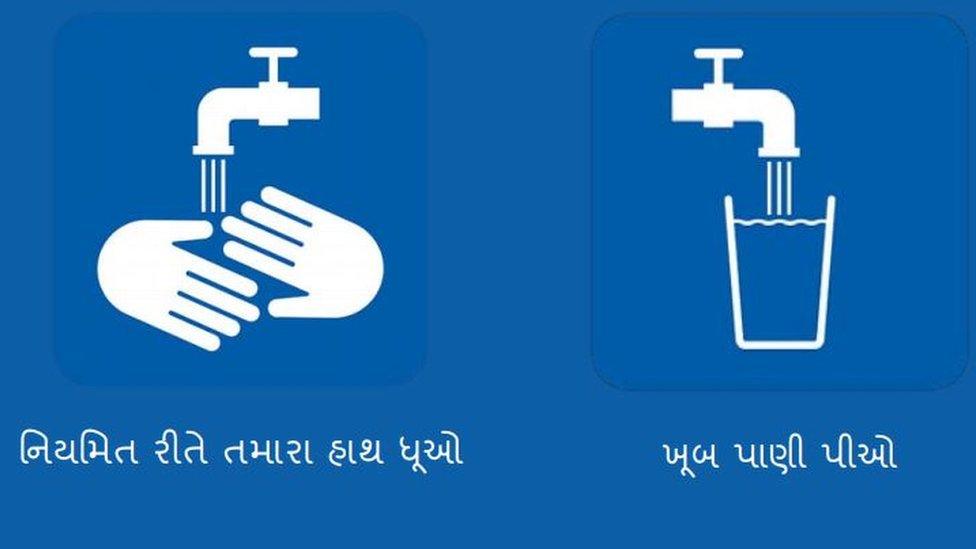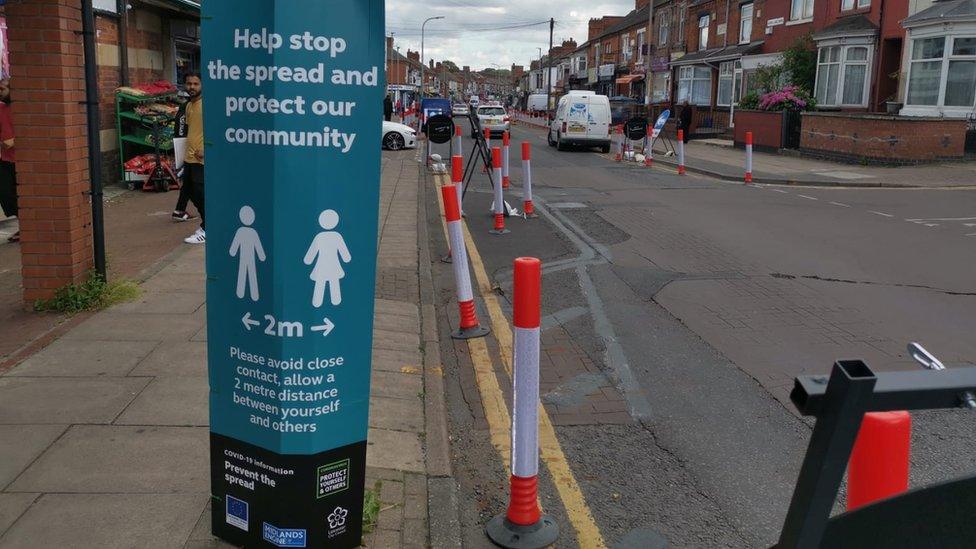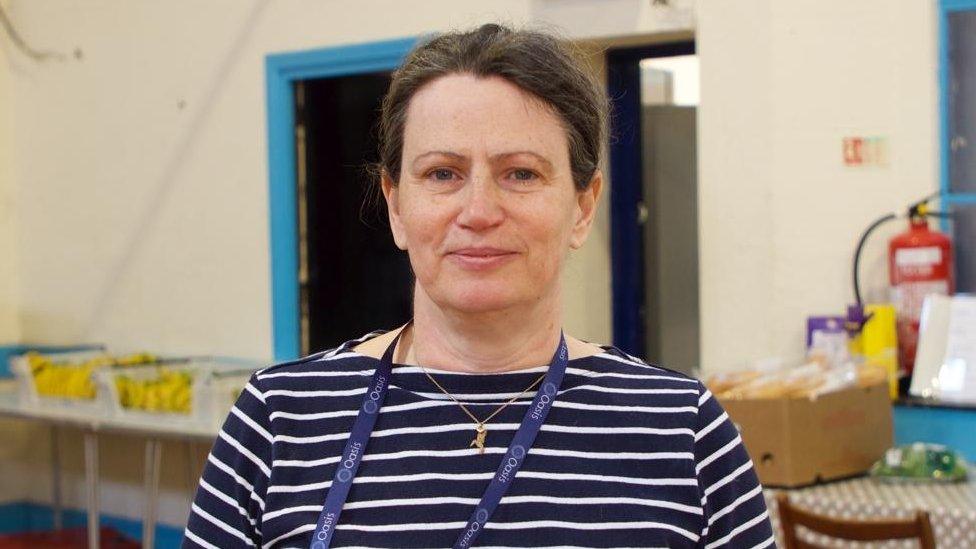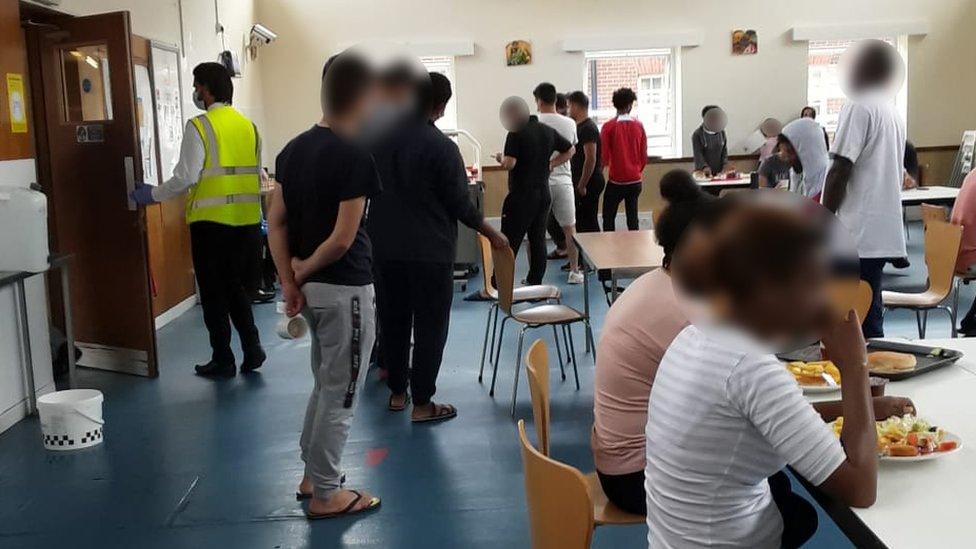Coronavirus: Safety fears over lack of translated virus advice
- Published

A charity has translated coronavirus advice into 60 languages (such as Gujarati) to combat what it calls a government "blind spot"
A lack of translated coronavirus guidance is jeopardising the safety of non-English speakers in the UK, a joint letter to the health secretary claims.
The government said it has translated public health information into 25 languages, reaching a "wide audience".
But campaigners say it is a "limited range of languages" and the translations can take weeks to be updated when advice or rules change.
One charity said the government has so far shown "no engagement" on the issue.
More than four million people in England and Wales do not consider English to be their main language, including more than 860,000 people who speak little or no English, according to the most recent official figures, external.
In England and Wales, 88 languages other than English are spoken as a main language.
A government spokesperson said it "wouldn't be feasible" to provide translations of all of these languages but that it had translated some of its "key messages" around coronavirus into the most common languages spoken in the UK.
Outdated translations
But translations have become outdated as guidance has been updated.
For example, in March the government provided guidance on social distancing in 11 languages, including Welsh, Urdu, Arabic and Bengali. But this advice was withdrawn on 1 May, external as guidance changed, and the current social distancing guide for England - which is titled "staying alert and safe", external - has not been translated by the government.
Other current guidance that has not been translated by the government includes information on the NHS Test and Trace programme, external and the rules on wearing face coverings, external.
The government said it was "committed to ensuring people across the UK receive the information they need to stay safe" during the pandemic, and had made coronavirus messages accessible "to a wide audience".
A language interpreting service was implemented at every test site on 16 July, weeks after testing capacity expanded to 200,000 per day on 29 May.
An online contact tracing platform is only available in English, though this may change in future, with non-English speaking cases and contacts referred to contact tracers who can access translation services.
According to the Department of Health: "Equality assessments have been undertaken to inform policy decisions to implement the service and, in line with our legal duties, we continue to assess impact as NHS Test and Trace is rolled out."
'Completely forgotten'
Some 30 local authorities, groups of public health leaders and charities have written to Health Secretary Matt Hancock and Communities Secretary Robert Jenrick urging the government to produce and continue to update information in more languages.
Doctors of the World, which co-ordinated the letter, runs clinics in London that provide medical care and information for "excluded people" such as non-English speaking migrants, asylum seekers, sex workers, homeless people and those with low literacy levels.
The charity said it has translated coronavirus guidance into documents, audio guides and videos in more than 60 languages, external because the government "has completely forgotten and left out this patient group" who are therefore "at increased risk of catching the virus, and are unable to protect themselves and their families".
Doctors of the World's head of policy and advocacy, Anna Miller, said there had been "no engagement" from Public Health England or the Department of Health when her charity asked, ahead of the UK lockdown in March, what resources might be provided for non-English speakers.
She said trying to highlight the "blind spot" had been like "hitting your head against a brick wall".
"It's just been an absolute lack of communication, or refusal to communicate, from central government, that has meant we've had to get on and do [the translations] as if government doesn't exist," she said.
"Ensuring public health information gets to everybody should have been the most basic, first thing in the government response. And 'everybody' includes people who don't speak English."

The resources produced by Doctors of the World have been downloaded about 60,000 times in the UK - including by police forces and groups providing accommodation for asylum seekers.
Doctors of the World says distrust of the NHS and government are leaving migrants scared to seek healthcare for Covid-19
Local authorities do provide translations of some of their own guidance, but Ms Miller said Doctors of the World had been told by several local authorities that they "can't keep up with the rapid changes of guidance", resulting in inconsistent and outdated information.
The letter, sent on Monday evening and seen by the BBC, called for leadership from central government to maintain "quality and consistency" of public health messages.
It added that it was Mr Hancock's "statutory duty" to provide translated resources.
It said: "As lockdown measures are eased and guidance changes regularly, it is not sustainable or practical for local authorities and civil society to meet this need."
- Published8 July 2020

- Published15 April 2020

- Published16 July 2020
